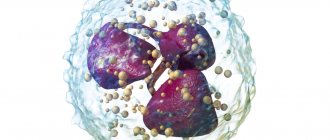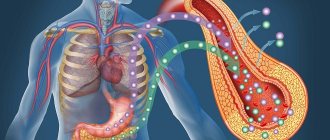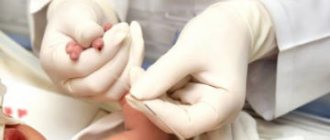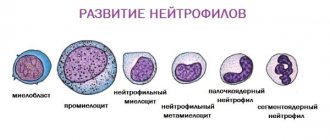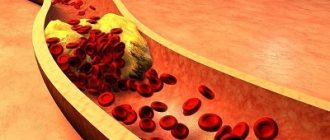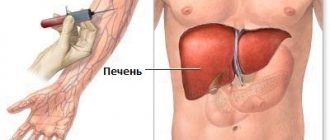Low blood cholesterol levels are no less dangerous than excess cholesterol levels.
The heart, blood vessels, and body tissues suffer; they lack building material and energy. Carbohydrates do not replace fats. In severe cases, dystrophy and hemorrhagic stroke develop.
The article will discuss the causes of low cholesterol, consequences and methods of treatment at home.
Reasons for the development of hypocholesterolemia
Why does hypocholesterolemia occur? Cholesterol is divided into several main types - high-density lipoproteins (HDL) and low-density lipoproteins (LDL). To date, experts do not provide accurate information as to why cholesterol in the blood is low. However, according to data from many years of practice, it is worth assuming that the disease can develop against the background of:
- Liver diseases. The organ takes an active part in the synthesis of cholesterol in the body. In cases where there is a malfunction in the functioning of the liver, the level of the substance may sharply decrease or increase.
- Poor nutrition, when a person consumes insufficient amounts of food containing fats. Cholesterol synthesis requires a certain amount of fat in the body. With a deficiency of the substance, cholesterol levels decrease. As a rule, statistics say that hypocholesterolemia is more common among thin people than overweight people.
- Genetic predisposition, in which a malfunction of the body occurs during the period of intrauterine development. This kind of cholesterol imbalance is difficult to overcome.
- Diseases of the digestive system that contribute to metabolic disorders or make it difficult to absorb food. Quite often, patients suffering from pancreatitis, stomach ulcers or gastritis experience low cholesterol in the blood.
- Systematic stress that negatively affects the functioning of internal organs and systems. Against the background of anxiety, a malfunction of the liver may occur, which will entail a change in cholesterol levels.
- Anemia of various origins.
- Heavy metal poisoning can cause cholesterol levels to drop below normal levels.
- Increased functionality of the thyroid gland.
- Systematic use of statins. As a rule, doctors prescribe this category of medications in the treatment of high cholesterol to reduce the concentration of certain lipid fractions in tissues and body fluids. To prevent such an effect from occurring, it is important to accurately observe the dosage of drugs and the duration of treatment.
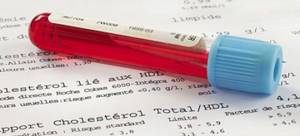
Low blood cholesterol is dangerous to health
By promptly and correctly establishing the cause of the pathological condition, you can quickly cope with hypocholesterolemia.
No ads 1
Blood lipid composition: interpretation and diagnosis
The content of various fats and their ratios in the blood is an important indicator of a person’s health. In some cases, it needs close monitoring, and sometimes correction. Let's figure out where the fats in the blood come from and how to keep track of them.
The role of fats in the body
The membranes of all cells in our body are a double lipid layer. Nerve fibers covered with a layer of myelin (a substance consisting of 75% fat) conduct impulses hundreds of times faster than “naked” fibers.
Without fats, fat-soluble vitamins D, E, K, A do not work (therefore, it is better to season carrot salad with vegetable oil). Hormones are built on the basis of the cholesterol molecule - sex hormones and glucocorticosteroids. And even the folds of fat on the body, from the point of view of nature, have a deep meaning: they are a shock absorber, insulation, and a reserve in case of hunger.
And at the same time, excess fat is a recognized risk factor for many diseases, from atherosclerosis to diabetes. Physical deposits of fat around and inside organs make them difficult to function. In addition, fat is a hormonally active substance, and its excess interferes with the functioning of the endocrine system, disrupting the balance.
The main fats that enter the body from the outside are triglycerides (neutral fats) and cholesterol. Triglycerides are used primarily as a storage substance and substrate for energy production. Cholesterol is the basis for the synthesis of steroid hormones, bile acids and vitamin D.
Types of lipoproteins in the blood
Fat cannot travel in the blood in the form of an ordinary drop, like in soup. Fats are transported in the body in the form of lipoproteins (LP) - compounds of fats and proteins. After absorption, fat molecules form conglomerates with protein molecules, and some of the proteins are a kind of label - the address to which fats must be delivered. The more protein there is in a lipoprotein, the higher its density will be.
If you take a blood test for a lipid profile (lipid spectrum), you will see the following names there:
- LDL
- low density lipoproteins. There are few proteins, a lot of fats, the direction of movement is from the liver to the tissues in which lipids should be used. - VLDL
is very low density lipoprotein. The ratio is shifted even more towards lipids, mainly “spare” ones, and these particles are sent to adipose tissue to replenish it. - HDL
is high density lipoprotein. These particles contain a lot of proteins, and they carry cholesterol “out” from the body - its excess will be eliminated through the liver. - TC
is total cholesterol, i.e. contained in all types of drugs in total. Every day, cholesterol comes from food, is produced by the body itself, and is excreted in bile. Therefore, there is the term “cholesterol balance” - 5.2–5.5 mmol/l in the blood. At this level, the risk of atherosclerosis is minimal, and there will be enough cholesterol to build all the necessary substances. - TG
is the sum of triglycerides in all medications.
Good, bad and too good
It seems that we need to fight to ensure that there are many PAPs and fewer of everyone else. Then cholesterol and triglycerides will move towards exit through the bile, and not towards accumulation in the form of atherosclerotic plaques and fat folds. In popular literature, HDL is often called “good cholesterol,” and LDL and VLDL are “bad” (although, strictly speaking, this is not exactly cholesterol).
Symptoms
It is impossible to determine hypocholesterolemia by external manifestations. To determine cholesterol levels, the patient must take a biochemical blood test performed on an empty stomach. In cases where you cannot visit the hospital for some reason, you should pay attention to your own well-being.
Symptoms such as lack of appetite for a long time, decreased sensitivity, systematic weakness, fatigue, and the presence of fatty loose stools can signal low cholesterol.
Enlarged lymph nodes, rapid mood swings, and decreased sexual activity appear. The listed symptoms may indicate hypocholesterolemia, so it is important to urgently consult a doctor and get tested!
Reasons for the downgrade
All causes can be divided into pathological and physiological. The first group is serious pathologies in the body, due to which the lipid content is greatly reduced. A deviation in concentration is just a consequence and is corrected when the root cause is eliminated.
Diseases that result in imbalanced fat balance:
- diseases of the digestive system. Predominantly small intestine, for example Whipple's disease. The absorption of fats into the bloodstream is impaired. They are displayed unchanged. Diet in this case is powerless. No matter how many lipids a person consumes, they will not be absorbed;
- endocrine disorders, tumors on the endocrine glands;
- diabetes;

Signs of diabetes, which often occurs with low cholesterol.
- disorders of the thyroid gland (hyperthyroidism). Metabolism in tissues is so intense that free fats are instantly absorbed by them, and their concentration in the blood decreases;
- congenital anomalies of the cardiovascular system;
- brain diseases;
- renal pathologies;
- disruption of the process of cholesterol formation in the intestines (with hepatitis and other chronic diseases).
If you have gone through all available research methods, and no serious diseases have been identified, pay attention to your lifestyle and diet. Imbalances may occur as a result of:
- strict diet (insufficient consumption of fats in food);
- intense physical activity combined with poor nutrition;
- active consumption of sweets;
- stress, lack of proper sleep and rest;
- smoking and alcohol abuse.
If you follow a vegetarian diet, then keep in mind that vegetable fats cannot fully cover the body's need for lipids. They are undoubtedly very useful, but only animal foods can raise cholesterol levels. Vegetarians are often diagnosed with dystrophy as a result of decreased fat levels. This is a serious dietary flaw.
Possible complications
Cholesterol can be both bad and good. Is low blood cholesterol good or bad? What does the pathology threaten and is it dangerous? Hypocholesterolemia poses a danger to human health. In addition to the fact that cancerous tumors may begin to develop, low cholesterol can cause:
Cholesterol test interpretation
- development of vascular fragility and circulatory disorders in the brain, which often leads to internal hemorrhages;
- disruption of the functioning of serotonin receptors, which provokes the occurrence of depression or attacks of aggression, in which the patient is unable to control his behavior;
- development of a syndrome of increased intestinal permeability, as a result of which accumulations of toxins are not eliminated from the body, but penetrate into the bloodstream and have a negative impact on the functioning of internal organs and systems;
- vitamin D deficiency in the body, which increases the risk of osteoporosis;
- low production of sex hormones, increasing the risk of infertility;
- impaired digestion of fats, which entails a risk of developing obesity.
Hypocholesterolemia is a dangerous disease that can provoke the development of various ailments. That is why it is important to take a blood test at the first symptoms and seek help from a doctor who will create an individual method of therapy that will allow you to overcome the unpleasant disease.
No ads 2
Characteristic symptoms and signs of abnormalities
Lipid imbalance can be determined by the following signs:
- constant fatigue, lack of energy and desire to do anything;
- pale skin, brittle nails, hair and other symptoms of vitamin deficiency;
- peeling and dry skin;
- sharp weight loss (or increase, in the case of a decrease in HDL);
- swelling of the lymph nodes;
- depression, apathy, attacks of aggression;
- muscle pain;
- poor appetite.
If fat deficiency is caused by impaired absorption of lipids in the intestine, then the characteristic symptom is steatorrhea. Fat stool. There is a large amount of undigested food debris and fatty traces in the stool.
Cholesterol test
To determine cholesterol levels, specialists from a certified medical center conduct a biochemical blood test. Blood should be donated in the morning on an empty stomach. To carry out the analysis, the patient will need to comply with a number of conditions. Eating food 12 hours before the test is prohibited. A few weeks before blood sampling, fatty foods are excluded from the menu.
Before going to the medical laboratory, it is recommended to refrain from smoking tobacco and drinking alcoholic and coffee drinks. The result of the biochemical analysis can be obtained the very next day. The most dangerous level is considered to be less than 3.1 mmol/l. In this case, it is important to urgently take measures to increase blood cholesterol levels.
Important! For any deviations in cholesterol levels, it is recommended to undergo a repeat biochemical blood test after a certain period of time for total cholesterol, HDL and LDL.
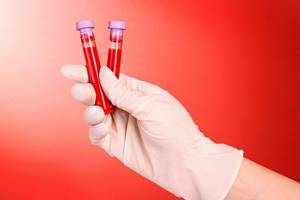
Donate blood only on an empty stomach
What to do and how to increase low cholesterol?
It is not recommended to prescribe medications on your own. They have side effects and contraindications. At home, you can correct the lipid balance by organizing your diet, taking vitamins and adequate physical activity.
Basics of proper nutrition for low blood cholesterol
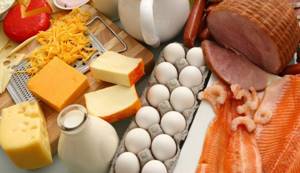
If there are not enough fats in the body, this does not mean that you need to actively eat them. They are different, the menu should be filled with the most useful and safe for blood vessels.
Give preference to meat broths, they contain a lot of lipids. Eat vegetable fats daily. They contain polyunsaturated fatty acids. These are omega-3, 6, 9. They replenish the lack of fat in the body, while dissolving the existing atherosclerotic plaques.
Meals during the diet should be fractional: 5-6 times a day plus snacks is the best option. Drink liquid after meals 30-40 minutes later. During meals, drinks dilute gastric juice and interfere with the absorption of nutrients. Recommended form of cooking: baking, boiling, stewing, steaming.
It is prohibited to use:
- fried foods;
- low-grade smoked meats;
- fast food, chips, crackers;
- margarine.
These dishes contain “harmful” fats; there is no need to fill the body with them.
5 best products
To increase your blood cholesterol levels, try to include the following dishes in your menu as much as possible. They contain highly digestible lipids that are beneficial for the body.

The best foods to increase your body fat levels.
Vegetable oils - olive, sesame, hemp, walnut. The oils contain omega-3 and a large amount of vegetable fats.
- Dairy products: cheese, cottage cheese, sour cream, cream, butter.
- Fatty fish: trout, salmon, mackerel, herring, capelin.
- Beef liver, tongue.
- Flaxseed oil and seeds (these products contain natural phytoestrogens, in addition to a high percentage of vegetable fats, the substances normalize hormonal levels).
Lifestyle and exercise
Physical activity is essential to improve blood flow. This is important when there is insufficient supply of tissues with nutrients.
Basic recommendations when playing sports:
- do not push yourself to the point of exhaustion, control the load;
- after your next exercise session, do not forget to eat well;
- do physical exercise after 16:00.
Pay special attention to proper sleep. Get a good night's sleep. You should spend at least 8 hours a day in bed. During your day's work, take breaks for snacks or simple rest. 15 minutes every 2 hours is the best option.
On weekends, try to be outdoors as much as possible. Oxygen improves tissue nutrition and restores them.
Vitamin complexes
Replenish the lack of fat-soluble vitamins. Take vitamins A, E and D in the form of capsules or oil solution. They are sold at any pharmacy. Use 1-2 times a day according to instructions.
You can take these substances as part of multivitamin complexes. They include not only vitamins, but also microelements. When signs of exhaustion appear, beneficial substances are especially needed.
Norms
Below is a table with cholesterol standards for males and females.
| Age category | Normal cholesterol levels in women | Normal cholesterol levels in men |
| 0-5 years | 2,91-5,19 | 2,95-5,25 |
| 5-10 years | 2,27-5,31 | 3,13-5,25 |
| 10-15 years | 3,22-5,21 | 3,09-5,23 |
| 15-20 years | 3,09-5,18 | 2,93-5,10 |
| 20-25 years | 3,16-5,59 | 3,16-5,59 |
| 25-30 years | 3,32-5,75 | 3,44-6,32 |
| 30-35 years | 3,37-6,58 | 3,57-6,58 |
| 35-40 years | 3,64-6,27 | 3,78-6,99 |
| 40-45 years | 3,81-6,53 | 3,91-6,94 |
| 45-50 years | 3,95-6,87 | 4,09-7,15 |
| 50-55 years | 4,20-7,08 | 4,09-7,17 |
| 55-60 years | 4,46-7,77 | 4,04-7,15 |
| 60-65 years | 4,46-7,69 | 4,12-7,15 |
| 65-70 years | 4,42-7,85 | 4,09-7,10 |
| 70-90 years | 4,49-7,25 | 3,73-7,86 |
As you age, cholesterol levels begin to rise. However, in males after 70 years of age, cholesterol in the blood may decrease sharply, which is considered a normal condition. Experts also note that women are much less likely than men to deposit “bad” cholesterol on the vascular walls due to the protective effect of female sex hormones.
What could be the causes of low blood cholesterol in women? Cholesterol levels may rise sharply during pregnancy, which is explained by hormonal changes. In addition, the pathological condition can cause a number of diseases.
No ads 3
Hypothyroidism is often the cause of hypocholesterolemia. Thyroid hormones take an active part in the process of regulating the level of cholesterol concentration in the circulatory system. In cases where the gland begins to produce a large amount of hormones, this means that the cholesterol level decreases sharply.
The indicator of the organic compound contained in the cell membranes (cholesterol) of an adult or adolescent is also influenced by the season. Mostly small fluctuations in the indicator occur in the winter months. Also, the results of a biochemical blood test can be affected by the phase of the menstrual cycle and the ethnic characteristics of the patient.
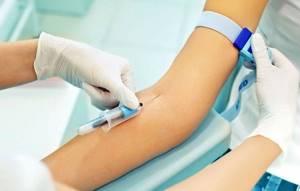
Biochemistry results are available after 12-20 hours
Treatment for Low Cholesterol
What to do if low-density cholesterol is low. After hypocholesterolemia has been confirmed by a biochemical blood test, you should immediately make an appointment with a specialist in the field of endocrinology. He will help you accurately determine the cause of low cholesterol and prescribe appropriate treatment.
Important! If your readings are low, self-medication is unacceptable!
How to increase cholesterol in the blood? First of all, you will have to make adjustments to your diet and follow the recommended dietary intake. The daily menu should consist of foods that help increase cholesterol levels, namely:
- Dutch hard cheese;
- caviar and beef brains;
- sea fish;
- flax and pumpkin seeds;
- eggs;
- nuts;
- seafood;
- beef kidneys and liver;
- butter.
[node:field_similarlink]
The doctor's recommendations regarding nutrition must be strictly followed by the patient, otherwise the effectiveness of therapy will be minimal. In no case should you saturate your diet with too fatty foods. As a rule, this leads to a sharp increase in bad cholesterol, which increases the risk of atherosclerosis.
Greens must be present on the dining table in unlimited quantities. Dill and parsley are considered especially useful. It is better to start the morning with a nutritious salad consisting of bell peppers, fresh carrots, white cabbage, celery, dill, and olive oil. If you want a heartier breakfast, you can serve boiled beef or turkey with the salad.
Quite often, to normalize the functioning of the liver, experts advise cleaning the liver using various recipes. In cases where the patient does not suffer from serious pathologies, normalization of cholesterol occurs by changing the diet. In addition, you will have to completely give up alcohol-containing products and smoking. Instead of harmful addictions, experts advise starting sports.
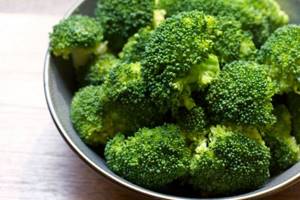
If you have hypocholesterolemia, you will need to review your diet
Preventive measures
It is much easier to prevent the onset of a disease than to treat it. To normalize blood cholesterol levels, as well as to prevent hypocholesterolemia, you will need to eat rationally, adhere to a healthy lifestyle, exercise and get rid of bad habits forever.
Each of us hears fairly simple rules every day, but, unfortunately, rarely does anyone follow them. By refusing to follow reasonable recommendations, you can speed up the time when the result of the analysis will notify you of an unpleasant diagnosis, which will not be easy to cope with. That is why it is better to think about health now and try to adhere to a healthy lifestyle.

